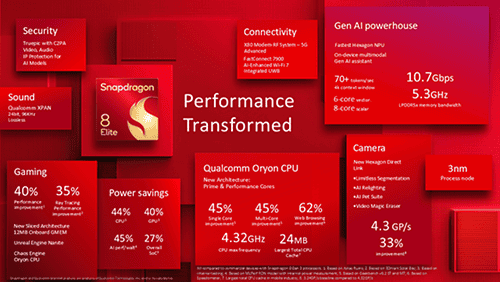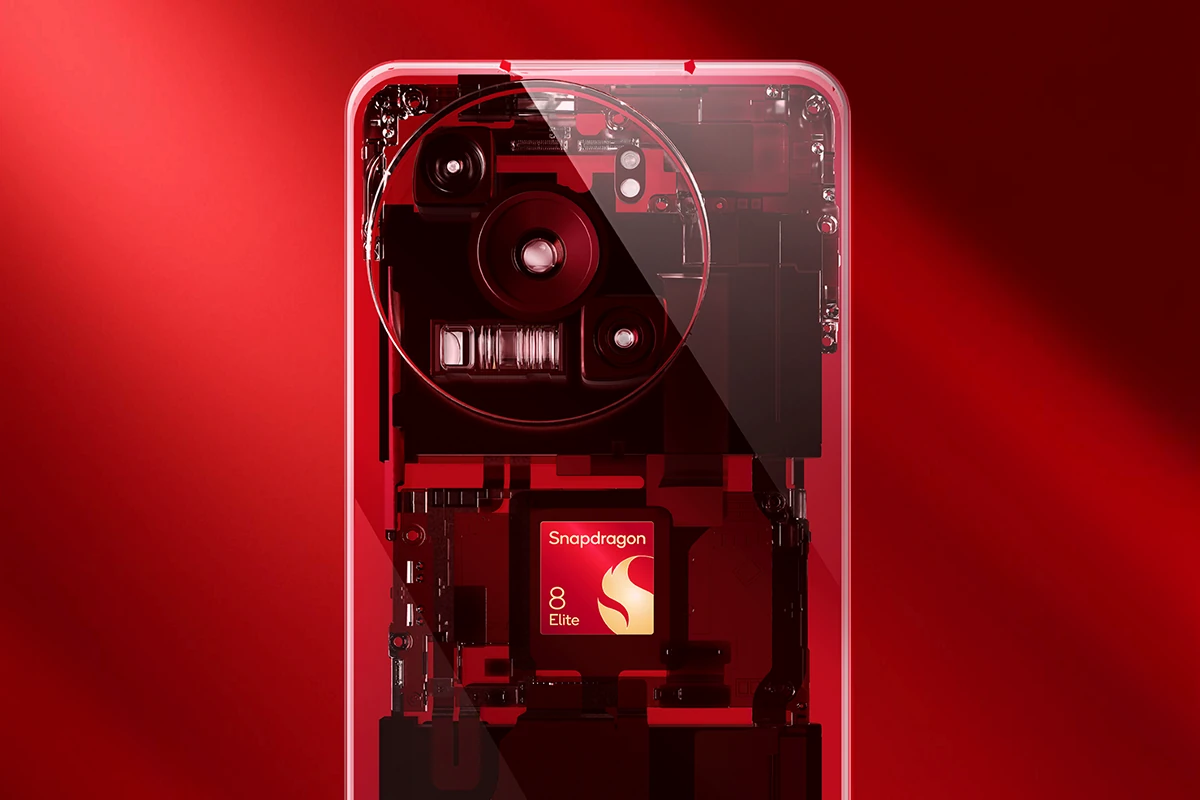Samsung will unveil its Galaxy S25 series on January 22, 2025 and the big surprise this year is that the entire lineup will feature Qualcomm’s Snapdragon 8 Elite chips. This is a worldwide deployment, meaning that Samsung will not be using their own Exynos chips in any regions (as they have with previous Galaxy series).
The Snapdragon chip will enhance AI capabilities and performance and is expected to be a core component of the most powerful Galaxy phone lineup ever released. The launch date for the S25 series is expected to fall sometime in February 2025 and is highly anticipated this year as expectations for improved AI functionalities, camera performance, and processing power are very high.

The decision to set aside Samsung’s own Exynos chip likely resulted from production issues with their Exynos 2500 chip. As a result, Samsung has chosen to rely entirely on Qualcomm for its S25 series. It remains uncertain whether Samsung will reintroduce the Exynos chip for future series, but this decision marks a significant shift for the company and has ignited discussions about potential consolidation in the mobile processor market, with Qualcomm positioning itself as a dominant player. The challenge for Samsung will be to justify any price increases to its customers.
Snapdragon Takes Center Stage
Samsung has made a surprising move by ditching its own Exynos processors in favor of Qualcomm’s Snapdragon chips for its entire Galaxy S25 lineup. This unexpected decision marks a significant shift in the smartphone industry and raises questions about the future of Samsung’s Exynos chips.
The Exynos Exodus
Traditionally, Samsung has equipped its flagship Galaxy S series with a mix of its in-house Exynos processors and Qualcomm’s Snapdragon chips, depending on the region. However, recent reports suggest that the Exynos 2500, Samsung’s latest flagship processor, faced production challenges and failed to meet performance expectations.
This setback, coupled with the impressive advancements in Qualcomm’s Snapdragon 8 Elite chip, likely influenced Samsung’s decision to go all-in with Qualcomm for the Galaxy S25 series.
A Win for Qualcomm
Qualcomm’s Snapdragon 8 Elite chip is poised to power all Galaxy S25 models globally, regardless of region. This move is a significant win for Qualcomm, solidifying its position as a leading provider of high-performance mobile processors.
The Snapdragon 8 Elite boasts several improvements over its predecessor, including enhanced CPU and GPU performance, improved power efficiency, and advanced AI capabilities. These upgrades are expected to translate into a smoother user experience, longer battery life, and enhanced camera features for the Galaxy S25 series.

What This Means for Consumers
For consumers, the switch to Snapdragon chips across the Galaxy S25 lineup could mean a more consistent and powerful user experience, regardless of where they purchase their device. Previously, there were often noticeable performance differences between Exynos and Snapdragon variants of Samsung phones.
With the Snapdragon 8 Elite at the helm, Galaxy S25 users can expect top-of-the-line performance, improved battery life, and enhanced camera capabilities.
The Future of Exynos
While Samsung’s decision to sideline Exynos for the Galaxy S25 series raises concerns about the future of its in-house chips, it’s important to remember that Samsung remains committed to its semiconductor business.
The company is likely to continue investing in Exynos development, focusing on addressing the issues that plagued the Exynos 2500 and refining its technology for future generations of processors.
It’s possible that Samsung may reintroduce Exynos chips in its flagship phones once it has regained confidence in their performance and competitiveness.

Galaxy S25 Series: Snapdragon Powerhouse
| Model | Processor | Expected Release Date |
|---|---|---|
| Galaxy S25 | Snapdragon 8 Elite | February 2025 |
| Galaxy S25+ | Snapdragon 8 Elite | February 2025 |
| Galaxy S25 Ultra | Snapdragon 8 Elite | February 2025 |
Samsung’s decision to embrace Qualcomm’s Snapdragon chips for the Galaxy S25 series marks a pivotal moment in the smartphone landscape. While the future of Exynos remains uncertain, consumers can anticipate a powerful and consistent user experience across all Galaxy S25 models.
Short Summary:
- Samsung confirms the inclusion of Qualcomm Snapdragon 8 Elite chipsets in the Galaxy S25 lineup.
- New AI functionalities are expected, aiming to surpass Apple’s offerings.
- Pre-reservation for devices is open, offering attractive incentives for early adopters.
The highly anticipated Samsung Galaxy S25 series is around the corner, with a confirmed launch event scheduled for January 22, 2025. This latest lineup will notably feature Qualcomm’s flagship Snapdragon 8 Elite chip, promising groundbreaking enhancements in both performance and artificial intelligence (AI) functionalities tailored to compete directly with market leader Apple. Tech leaks have teased a range of impressive features for the Galaxy S25, including rich AI capabilities that have yet to be disclosed, which hint at Samsung’s strategy to position itself as the clear frontrunner in device AI.
According to reputable tech insider, Ice Universe, the upcoming Galaxy S25 series will redefine the standards of AI in smartphones. He remarked,
“Samsung Galaxy S25 will tell Apple what leading AI is.”
His comments underline the anticipation surrounding Samsung’s new offerings, particularly regarding AI innovation that hasn’t been disclosed yet, leaving many users curious and eager for further information. The excitement builds as many look back at previous generations and compare the forthcoming features with what Apple provides.
During the recent New Year address from Samsung Electronics’ leadership, Vice Chairman and CEO Jong-hee Han expressed a desire to,
“…establish the company as the undisputed leader in device AI this year through advanced intelligence.”
Such remarks indicate Samsung’s commitment to innovation and a determination to make meaningful advancements within its next-generation flagship devices. This ambition aligns seamlessly with the enhancements that Qualcomm’s Snapdragon 8 Elite brings to the table.
What to Expect from Snapdragon 8 Elite
This latest chipset will not only boost standard operating speeds but also facilitate significant breakthroughs in AI performance. Qualcomm claims that the Hexagon NPU within the Snapdragon 8 Elite could deliver a remarkable 45% improvement in AI capabilities while optimizing power consumption by the same margin. Such enhancements mean that the Galaxy S25 series will be considerably more efficient than its predecessor, the Galaxy S24 Ultra, which utilized the Snapdragon 8 Gen 3.
One of the exciting possibilities tied to the Snapdragon 8 Elite is its ability to enable advanced camera functionalities. Users may anticipate features that include:
- Limitless Semantic Segmentation at 4K resolution
- An innovative on-device video object eraser
- Real-time AI-driven adjustments for skin tones and sky colors
- Enhanced performance in ultra-low-light video capture scenarios
These capabilities represent a holistic enhancement for the Galaxy S25 series cameras. It is expected that Samsung will leverage these features to provide significant upgrades that software updates for previous models would not achieve. Thus, the S25 series is set to stand apart through in-built capabilities rather than simple enhancements, establishing a clear benchmark for future devices.
The Upcoming Unpacked Event
The buzz around the Galaxy S25 has intensified with the official announcement of the Unpacked event, where reservations are already live. Early adopters can snag perks like $50 in Samsung Credit and potential savings of up to $1,250 alongside entry into a $5,000 sweepstakes for US residents. The promotional teaser hints at Samsung’s plan to introduce a genuine AI companion in its devices, indicating a sturdy emphasis on AI technology in the S25 lineup. Viewers can expect an exclusive preview of what “Galaxy AI” entails when the event airs on January 22.
The Galaxy S25 series will consist of three key models: the Galaxy S25, Galaxy S25+, and the Galaxy S25 Ultra. As Samsung opts for Qualcomm Snapdragon 8 Elite chipsets across the board, a noteworthy shift is observed. Previously, Samsung used to be more selective with its chipsets, employing its own Exynos chips in several regions. However, the ongoing challenges associated with the Exynos 2500, particularly concerning low fabrication yields (between 20% and 30%), have prompted this shift towards Qualcomm’s chipsets that assure higher reliability and performance.
Price Implications of the Shift
The switch from Exynos to Qualcomm will likely lead to increased prices for the Galaxy S25 series. Reports indicate that Qualcomm’s Snapdragon 8 Elite chip is priced at approximately $190, which could raise the overall production cost of the S25 devices. Given the advanced processing capabilities and the accompanying AI features, such a price adjustment seems reasonable in the competitive landscape of flagship smartphones.
Samsung’s prior challenges with pricing strategies are worth noting, especially as they had once faced backlash when using their Exynos chip in earlier models. During the production of the Snapdragon 8 Gen 1, low yield rates led Qualcomm to pivot to TSMC for chip fabrication, highlighting the ongoing issues in Samsung’s chip production operations.
Global Chip Strategy: Exynos vs. Snapdragon
The long-standing dynamic between Qualcomm’s Snapdragon and Samsung’s Exynos chips has created a unique market scenario. Traditionally, regional differences dictated chipset choices, where Snapdragon chips were supplied primarily to regions like the USA and South Korea, while Exynos chips were allocated to others, including India. However, the latest benchmarks reveal that the international variant of the Galaxy S25 is indeed adopting the Snapdragon 8 Elite chipset exclusively, regardless of the regional distinctions.
Notably, Geekbench scores for the Galaxy S25 showcase impressive metrics with a single-core score of 2,986 and a multi-core score of 9,355, demonstrating the potential for significant performance improvements. This suggests a shift in strategy, as Samsung has prized Qualcomm’s Snapdragon offerings for their better performance and efficiency compared to Exynos alternatives.
This decision to universally adopt Snapdragon illustrates a fundamental change in Samsung’s approach to smartphone manufacturing. Doubling down on Snapdragon could enhance user satisfaction, given the historical preference for Qualcomm’s chips among tech enthusiasts. However, users must be mindful that this decision may also contribute to escalating prices across the Galaxy S25 series.







